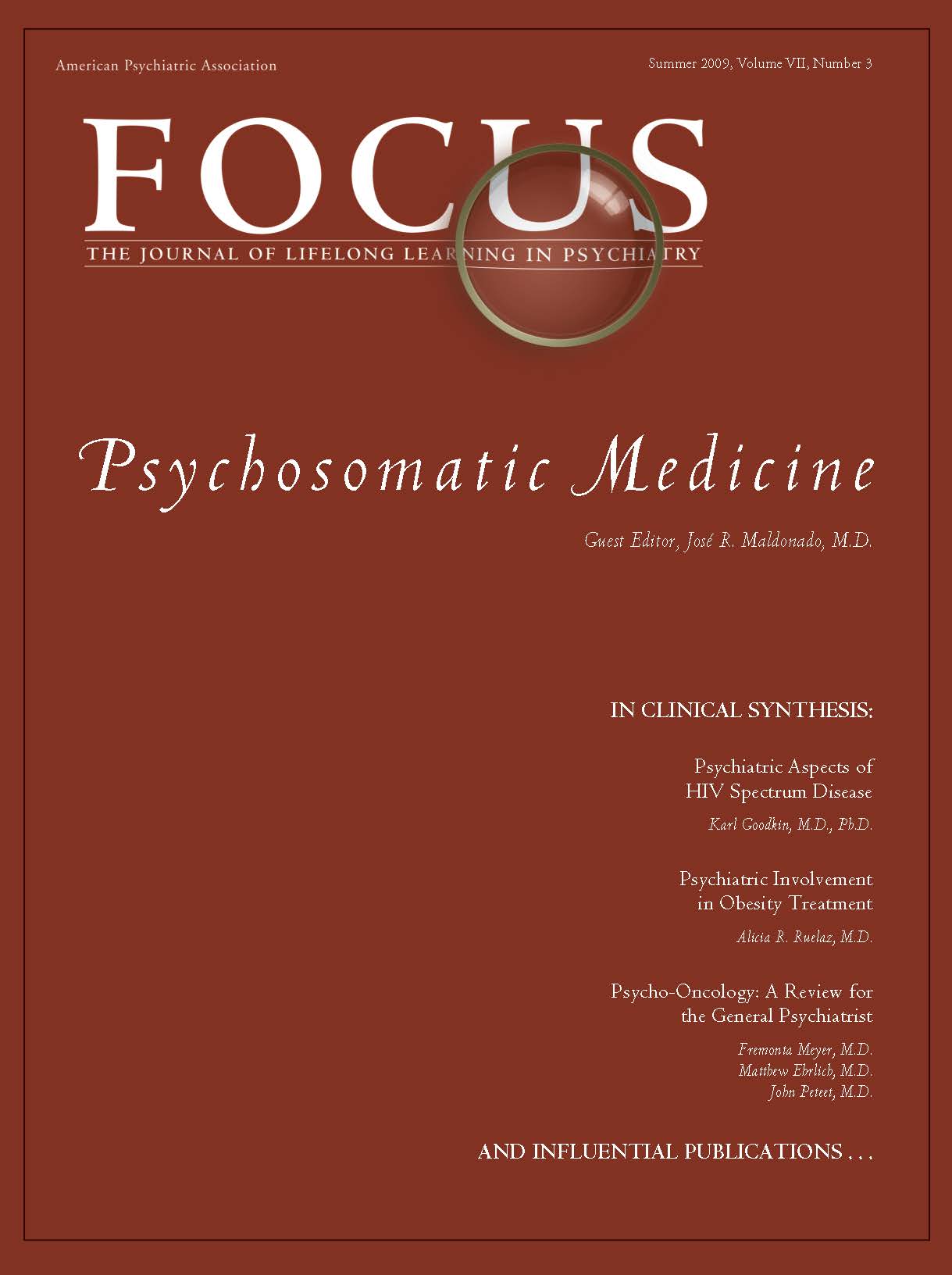From the Guest Editor
Psychosomatic medicine is an area of subspecialization in psychiatry concerned with the psychobiological care of patients with medical illnesses. The patient population includes persons of all ages and those cared for in specialized settings such as medicine, surgery, neurology, oncology, and obstetrics and gynecology. Psychiatrists in the field of psychosomatic medicine, in addition to providing expert formal psychiatric consultation to medical and surgical patients in the general hospital, specialized hospitals, and outpatient clinic settings, also educate psychiatrists and nonpsychiatrists on issues of drug-drug interactions and in the recognition of normal and abnormal reactions to illness and appropriate psychological care of patients with such reactions.
The main purpose of psychosomatic medicine is to provide aid to patients who are in the midst of dealing with medical and surgical illnesses and who develop a psychiatric complication. These conditions can arise as a psychological reaction to their medical disease (e.g., an adjustment disorder after news of cancer), a psychiatric complication of a disease process (e.g., poststroke depression, postpartum psychosis, or delirium), the psychiatric side effects of medical treatment (e.g., organic mood disorder after chemotherapy or immunosuppressant treatment, such as depression due to the use of α-interferon; or steroid-induced mania), or the need to face their own disability or mortality. It is common for psychosomatic medicine specialists to assist in the acute management of acute confusional states, the assessment of suicidal patients, the determination of capacity to refuse or accept a medical procedure, and the management of acute intoxications or withdrawal states. Psychosomatic medicine specialists also consult on or manage those patients with primary psychiatric disorders who happen to become ill and are subsequently hospitalized for medical/surgical care.
The term psychosomatic was initially introduced by Johann Heinroth in 1818. The unofficial origin of “psychosomatic medicine” probably dates back to 1873 when J.J. Putnam, perhaps the first consultation-liaison psychiatrist, was assigned the task of “evaluating medical patients at Massachusetts General Hospital whose complaints defied diagnoses.” The term psychosomatic medicine was coined in 1922 by Felix Deutsch. In the 1930s a group of psychoanalytically trained and oriented psychiatrists, internists, and pediatricians began to establish the foundations for the field. The real founders of the movement were Flanders Dunbar at Columbia, Stanley Cobb at the Massachusetts General Hospital, Edward Weiss and O. Spurgeon English at Temple, Franz Alexander at the Chicago Psychoanalytic Institute, and Harold Wolfe at Cornell. In 1977 George Engel published “The Need For a New Medical Model: A Challenge for Biomedicine” in the journal Science. In this influential thesis, he made the case for the incorporation of the “biopsychosocial model” into medical practice. This concept is the cornerstone of much of the basic clinical teaching in our medical schools today and lies at the center of psychosomatic medicine as a specialty.
Throughout the years, practitioners of psychosomatic medicine have made great contributions in the fields of medicine and psychiatry. Among them is a great body of research on the mind-body interaction. Most of these research contributions initially appeared in medical or surgical journals and have had a significant impact on the way medicine is practiced today, from the understanding of the link between depression and heart disease, to the relationship between thyroid and other bodily hormones and mood states, to the effects of sedatives on brain functioning and postoperative delirium.
Yet, despite all these accomplishments, it was not until 2003 that the American Board of Psychiatry and Neurology, in concurrence with the American Board of Medical Specialties, established a Committee on Certification in the Subspecialty of Psychosomatic Medicine. With this action, the field of psychosomatic medicine was officially established as an area of subspecialization in psychiatry, and the process of setting the standards for training psychosomatic medicine subspecialists began.
This issue of Focus is a testament to the great contributions psychosomatic medicine can make to psychiatry and medicine in general. In their original articles, Dr. Goodkin details the neuropsychiatric complications of HIV infection, Drs. Meyer, Ehrlich, and Peteet provide an overview of the field of psycho-oncology and the major complications of cancer treatment, and Dr. Ruelaz discusses the effects of psychiatric treatment on metabolism and the need for better weight management. In two separate articles, I review the psychosocial aspects of organ transplantation and provide a summary of the risk factors for delirium, as well as a discussion of treatment guidelines.
During my training at Temple University, where I was supervised by Dr. English, and later at the New England Medical Center under the dedicated instruction of Judith Milne, I had an opportunity to be introduced to and inspired by the wonders of the mind-body connection and the devastating results of a disconnect. We hope this volume inspires the reader to further explore into the fascinating and important field of psychosomatic medicine.



